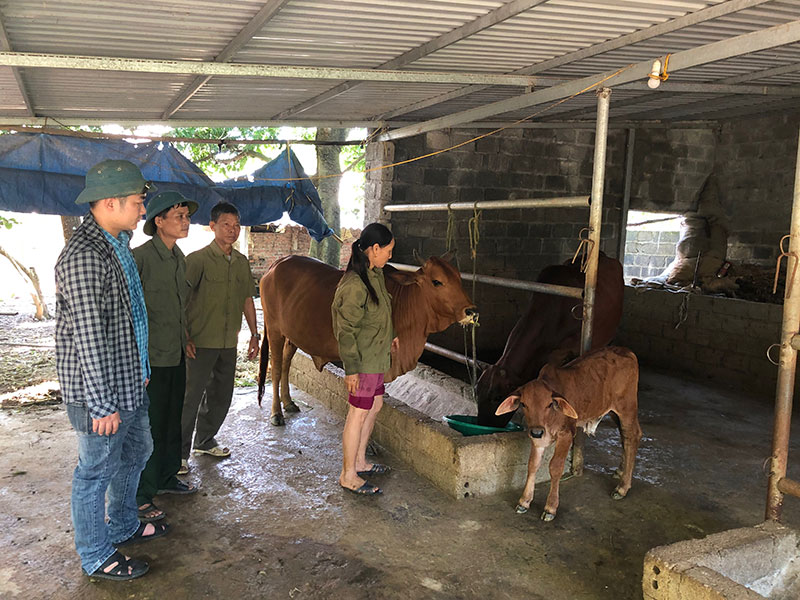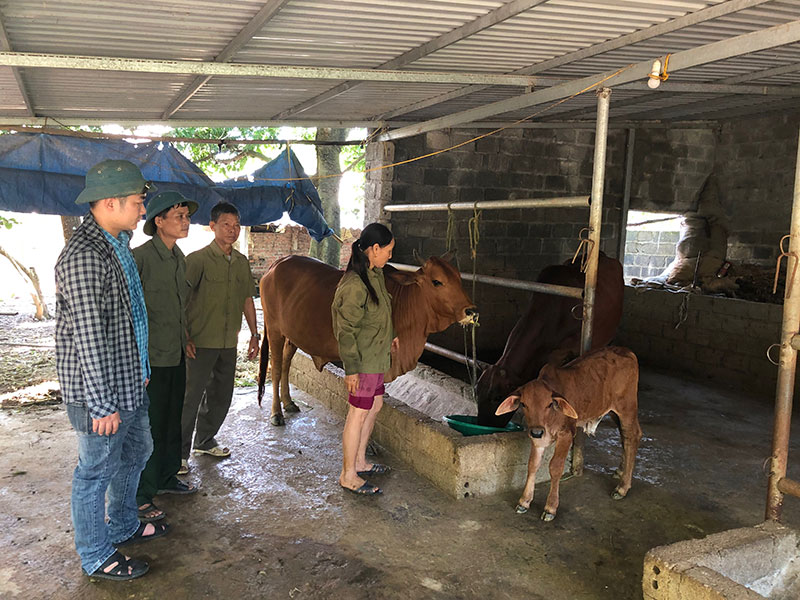
(HBO) – Households in Hoa Binh have developed livestock breeding with many effective models of cooperation groups and cooperatives in buffalo and cow breeding. In Luong Son district, the breeding cow cooperation group in Nghia Kep village, Hop Chau commune is considered as a typical one.
 The breeding cow
growing model of member households of Nguyen Thi Thuy cooperation group shows
high efficiency.
The breeding cow
growing model of member households of Nguyen Thi Thuy cooperation group shows
high efficiency.
The daily job of Nguyen Xuan Linh and his wife, members of
the breeding cow cooperation group in Nghia Kep village, is cutting and
gathering grass for cows.
Linh said that since 2014 when he started switching the
breeding of other kinds of livestock to cows, his family’s income has been
improved and become more stable.
As an agricultural village, Nghia Kep has favourable natural
conditions for breeding and cultivation.
Nguyen Cong Chinh, head of Nghia Kep village said that while
switching the structure of plant cultivation, the village has set up a number
of models attracting households with the same interest and goal to support each
other to sustainably reduce poverty and become richer.
Three typical and effective groups in the locality are those
to develop citrus trees, chicken and breeding cow.
With 16 members, the breeding cow cooperation group in Nghia
Kep currently has 37 cows. Incomes of its members are from middle to high
level.
The locals have had strong awareness of ensuring reserve
food for cows as well as methods to raise, and prevent diseases for the cow
herd, thus maintaining sustainability and efficiency of the model.
So far, the model has been expanded to the whole village,
bringing the total cows to 60, contributing to enhancing per capita income for
locals to 17 million VND in 2018 and expectedly 20 million VND in 2019.
According to data from the Hoa Binh Provincial Party Committee, the industrial production index for the first six months of 2025 is estimated to have increased by 20% compared to the same period last year. This marks the highest year-on-year growth rate for this period since 2020.
In the first six months of 2025, Hoa Binh province’s export turnover was estimated at 1.145 billion USD, marking an 18.11% increase compared to the same period in 2024. Import turnover was estimated at $ 804 million, a 17.15% increase, which helped the province maintain a positive trade balance.
The lives of the ethnic minority farmers in Tan Lac district have gradually improved thanks to the new directions in agricultural production. This is a testament to the collective strength fostered through the professional associations and groups implemented by various levels of the district’s Farmers’ Union.
With the motto the "product quality comes first,” after nearly one year of establishment and operation, Muong village’s Clean Food Agricultural and Commercial Cooperative, located in Cau Hamlet, Hung Son Commune (Kim Boi district), has launched reputable, high-quality agricultural products to the market that are well-received by consumers. The products such as Muong village’s pork sausage, salt-cured chicken, and salt-cured pork hocks have gradually carved out a place in the market and they are on the path to obtaining the OCOP certification.
In the past, the phrase "bumper harvest, rock-bottom prices" was a familiar refrain for Vietnamese farmers engaged in fragmented, small-scale agriculture. But today, a new spirit is emerging across rural areas of Hoa Binh province - one of collaboration, organisation, and collective economic models that provide a stable foundation for production.
Maintaining growing area codes and packing facility codes in accordance with regulations is a mandatory requirement for agricultural products to be eligible for export. Recently, the Department of Agriculture and Environment of Hoa Binh province has intensified technical supervision of designated farming areas and packing facilities to safeguard the "green passport" that enables its products to access international markets.



 The breeding cow
growing model of member households of Nguyen Thi Thuy cooperation group shows
high efficiency.
The breeding cow
growing model of member households of Nguyen Thi Thuy cooperation group shows
high efficiency.